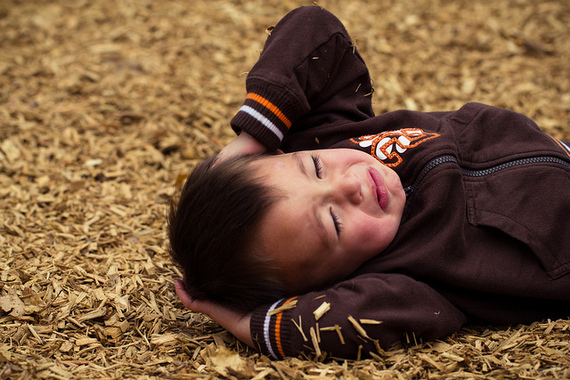There are two camps with different opinions about why kids whine.
Camp One: It is a learned behavior designed to manipulate adults into doing something and should be ignored or corrected. (Subtext: If you don't respond this way your child will become entitled, annoying and manipulative, i.e., an aggressor.)
Camp Two: It is an expression of deeply vulnerable emotions that should be empathized with and attended to. (Subtext: If you don't respond this way your child will become emotionally shut down, non-trusting, and wounded, i.e., a victim.)
Hate these options? Me, too.
Whining starts when children first develop speech. It is similar to crying in that it is high pitched, slowed down, and has exaggerated changes from high to low. Research has shown that humans are particularly sensitive to whining; it makes our skin literally crawl (higher skin reactivity), distracts us from whatever else we are doing (more than crying!), and draws us closer to the whiner.
In essence -- whining gets our attention and signals distress. The more distress is signaled, through more dramatic vocal qualities, the more it motivates us to DO SOMETHING.
And, children aren't the only ones who whine. Adults whine to their parents, no matter how old. Romantic partners whine to each other -- "I wish I had ice creeeeee....aaaaam....." (sad face sad face sad face). Since grown-ups have more sophisticated language, we can usually articulate our needs for help without whining; but, if we want to convey that we are feeling over-taxed and want to be cared for as if we were a baby, we will whine.
So, sometimes a child's whining is going to be because he or she just can't keep it together anymore and needs your help. Children tend to whine most between 2.5 and 4-years-old when they have the language to communicate their needs, but it takes A LOT of effort to hold down all the big feelings. So, when they're tired, hungry, or overstimulated they may whine to let us know, "I can't act big anymore, please take care of me like I was a baby."
When it seems like your child is expressing these emotions of being over-taxed, the best approach might be to reflect back the subtitles of the whining -- "It's so hard to wait. You're exhausted. It feels too hard to talk like a big girl right now." Just like you might want your partner to get you some ice cream without saying "Ask in your big girl voice," your child would love it if sometimes you just helped without pushing for him or her to pull it together.
And at other times, your child may be feeling well put together, but want to test what happens when he or she plays up the whining voice. You may have the sense that there isn't much vulnerable emotion underneath the whine, and it feels more like you child is asking, "Is this a good way to get some power around here?" Also a totally legit, developmentally appropriate thing for a child to explore.
If you're feeling like your child can and should be challenged to meet the expectation of pulling it together and using a big kid voice, then it makes sense to set that expectation. In my house, I say simply, "Try again." This sends the message that if and when you are emotionally resilient, I am going to challenge you to communicate your needs with your words rather than your tone of voice. I might even give them some words they could use and show them the tone of voice I expect -- "Say, 'Mommy, could I please have some water?' I will wait."
For better or for worse, whining isn't either a manipulation or a plea for tender loving care. It would be easier for us if it were just one of those -- then we wouldn't have to struggle so much to figure out the best response.
Instead, whining is sometimes a power play and sometimes a legitimate request for emotional support. It requires us to listen to each whine and think about the context.
This listening is hard. In order for our ears to hear the subtleties we have to be calm, emotionally resilient, have the time. We don't always have these things.
So you won't always hear it right, and you might come down too hard or give in too much.
But that's how parenting is; expect to get it wrong multiple times a day.
Then find your own place to whine about how annoying whining is.
Image credit: Michael Bentley on Flickr
